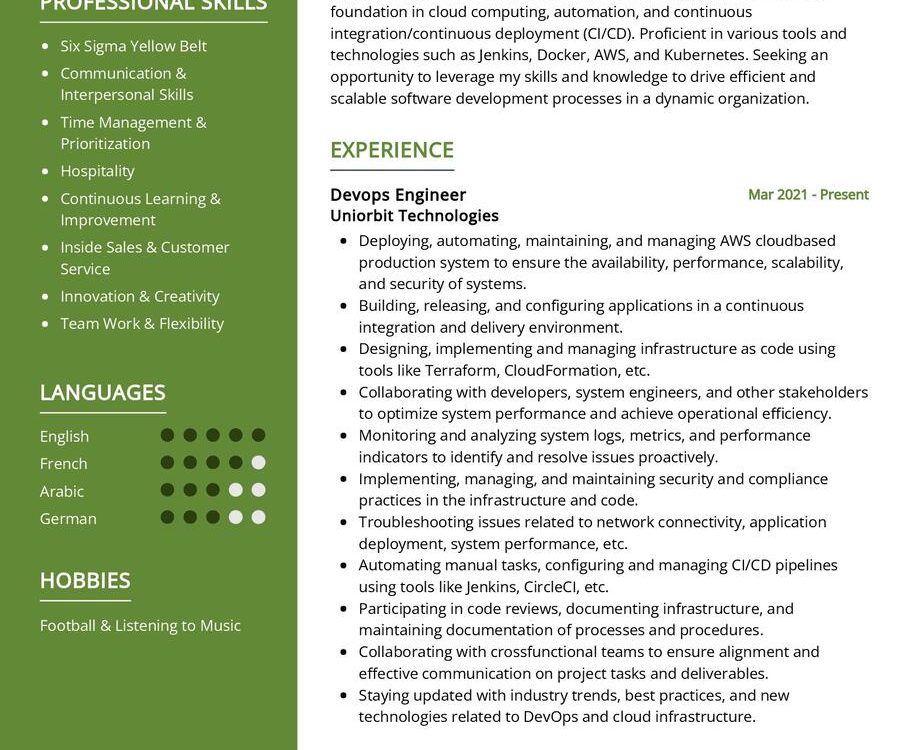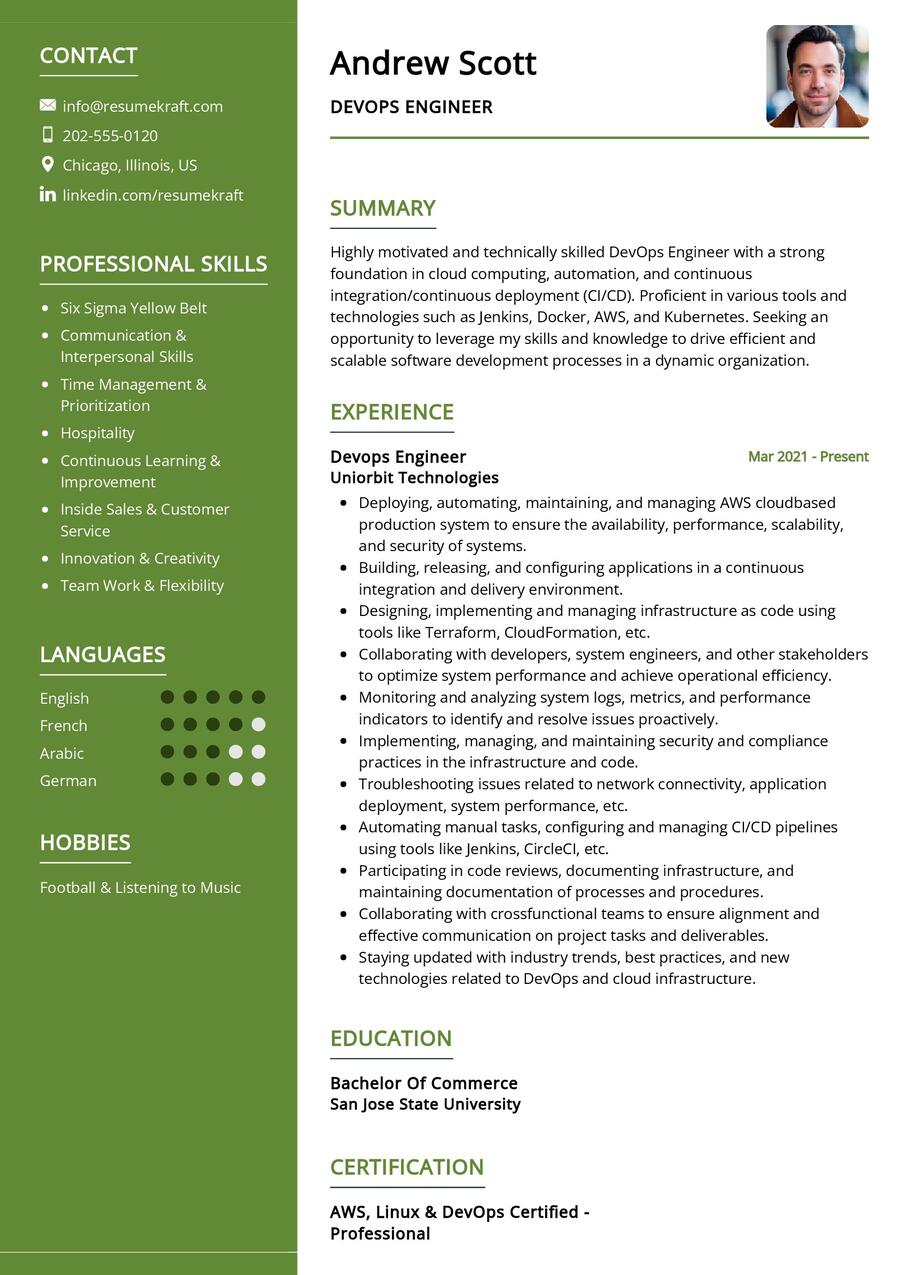Exploring the Role of a DevOps Engineer
The tech landscape is continually evolving, and in this dynamic environment, the role of a DevOps Engineer has become integral to the success of organizations worldwide. This position requires a unique blend of technical prowess and operational finesse to ensure the seamless integration of development and operations. Let’s delve into the multifaceted role of a DevOps Engineer, examining the skills, responsibilities, and qualifications that make this role essential in today’s tech-driven world.
What are the DevOps Engineer Job Requirements?
Becoming a DevOps Engineer involves meeting a set of rigorous requirements, a journey that demands both dedication and continuous learning. Let’s explore the prerequisites that one needs to fulfill to embrace the role of a DevOps Engineer:
- A Bachelor’s or Master’s degree in Computer Science, Information Technology, or a related field, providing a solid foundation in the technical domain.
- Proficient knowledge of DevOps principles and practices, including continuous integration, continuous delivery, and infrastructure as code.
- Hands-on experience with popular DevOps tools such as Jenkins, Docker, Kubernetes, and Ansible.
- Expertise in scripting languages like Python or Shell for automation tasks.
- Strong understanding of cloud platforms like AWS, Azure, or Google Cloud.
- Experience with version control systems, such as Git, to manage and track changes effectively.
- Excellent problem-solving skills and the ability to troubleshoot complex issues in a fast-paced environment.
Securing additional certifications in DevOps practices can significantly enhance your profile and competitiveness in the job market.
What are the Responsibilities of a DevOps Engineer?
The role of a DevOps Engineer is diverse, requiring a combination of technical acumen and strategic thinking. Let’s unravel the core responsibilities that define this role:
- Collaborating with development and IT operations teams to streamline the development lifecycle, from coding to deployment.
- Implementing and managing continuous integration and continuous deployment (CI/CD) pipelines to automate software delivery.
- Automating manual processes to enhance efficiency, such as configuration management and infrastructure provisioning.
- Monitoring system performance and ensuring the availability and reliability of applications.
- Implementing security best practices throughout the development and deployment processes.
- Facilitating communication and collaboration between development and operations teams to foster a culture of collaboration.
- Staying abreast of industry trends and emerging technologies to recommend innovative solutions.
Each responsibility comes with its unique challenges and learning opportunities, contributing to the continuous growth of a DevOps Engineer.
DevOps Engineer CV Writing Tips
Crafting a standout CV as a DevOps Engineer involves showcasing your skills and experiences effectively. Here are some tips to help you create a compelling document:
- Highlight your experience with specific DevOps tools and technologies, emphasizing your contributions to successful project outcomes.
- Showcase your expertise in implementing and optimizing CI/CD pipelines, detailing the impact on project delivery timelines.
- Quantify your achievements with metrics, demonstrating the efficiency improvements and cost savings resulting from your initiatives.
- List relevant certifications, illustrating your commitment to staying updated in the dynamic field of DevOps.
- Customize your CV for each application, aligning your skills and experiences with the specific requirements of the job.
Each tip is a step towards creating a CV that effectively communicates your value as a DevOps Engineer.
DevOps Engineer CV Summary Examples
Your CV summary is the opening chapter of your professional story, providing a snapshot of your experiences and skills. Here are some examples to inspire you:
- “DevOps Engineer with over 8 years of experience, adept at implementing robust CI/CD pipelines and optimizing deployment processes for enhanced efficiency.”
- “Experienced DevOps professional skilled in automating manual processes and ensuring the security and reliability of complex systems.”
- “Results-driven DevOps Engineer with a proven track record in implementing scalable and secure infrastructure solutions on cloud platforms.”
Each summary is a glimpse into your career journey, showcasing your strengths and expertise as a DevOps Engineer.
Create a Strong Experience Section for Your DevOps Engineer CV
Your experience section is the core of your CV, narrating the story of your career journey. Here are some examples to guide you:
- “Led the implementation of a CI/CD pipeline, resulting in a 30% reduction in software delivery time for a critical project.”
- “Managed the automation of infrastructure provisioning, enhancing scalability and reducing manual errors by 25%.”
- “Collaborated with cross-functional teams to troubleshoot and resolve critical system issues, ensuring optimal application performance.”
Each experience is a chapter in your professional book, detailing your contributions and impact as a DevOps Engineer.
Sample Education Section for Your DevOps Engineer CV
Your educational background is the foundation of your career, providing evidence of your expertise. Here’s how you can list your educational milestones:
- Master of Science in Computer Science, XYZ University, 2015.
- Bachelor of Technology in Information Technology, ABC University, 2012.
- Certified Kubernetes Administrator (CKA), a recognition of your proficiency in Kubernetes, 2019.
Each educational qualification is a stepping stone, contributing to your success as a DevOps Engineer.
DevOps Engineer Skills for Your CV
Your skill set is your toolkit, equipped with a variety of skills that define your capabilities. Here are the essential skills for a DevOps Engineer:
Soft Skills:
- Collaboration and teamwork, fostering effective communication between development and operations teams.
- Problem-solving abilities, quickly identifying and resolving issues in complex environments.
- Adaptability and flexibility, thriving in a fast-paced and ever-changing tech landscape.
- Effective communication, conveying technical information clearly to both technical and non-technical stakeholders.
- Attention to detail, ensuring accuracy and precision in all aspects of your work.
Hard Skills:
- Proficiency in popular DevOps tools such as Jenkins, Docker, Ansible, and Terraform.
- Experience with cloud platforms, including AWS, Azure, or Google Cloud.
- Scripting skills in Python, Shell, or other relevant languages for automation tasks.
- Knowledge of containerization technologies, such as Docker and Kubernetes.
- Security best practices for application and infrastructure protection.
Each skill is a tool, contributing to your ability to excel as a DevOps Engineer.
Common Mistakes to Avoid When Writing a DevOps Engineer CV
Crafting your CV as a DevOps Engineer requires attention to detail to avoid common pitfalls. Here are some mistakes to steer clear of:
- Avoid using a generic CV for all applications; tailor your CV to match the specific job requirements.
- Focus on achievements rather than job duties, providing depth to your narrative.
- Don’t overlook the importance of a cover letter; use it as an opportunity to connect with potential employers.
- Avoid excessive technical jargon in your CV; ensure it remains accessible to both technical and non-technical readers.
- Always proofread your CV to maintain a professional image; typos can leave a negative impression.
Each mistake is a potential stumbling block; avoid them to create a CV that is both authentic and compelling.
Key Takeaways for Your DevOps Engineer CV
As we conclude this comprehensive guide, let’s recap the key points to consider while crafting your DevOps Engineer CV:
- Highlight your expertise with specific DevOps tools and technologies, emphasizing their impact on project outcomes.
- Showcase your ability to implement and optimize CI/CD pipelines, detailing the positive effects on project delivery timelines.
- Quantify your achievements with metrics, demonstrating efficiency improvements and cost savings resulting from your initiatives.
- Include a section on continuous learning, showcasing relevant certifications and courses undertaken in the field of DevOps.
Finally, feel free to utilize resources like AI CV Builder, CV Design, CV Samples, CV Examples, CV Skills, CV Help, CV Synonyms, and Job Responsibilities to create a standout application and prepare for the DevOps Engineer job interview.
Armed with these insights and tips, you are now ready to craft a CV that is a true reflection of your journey, your skills, and your aspirations. Remember, your CV is not just a document; it is a canvas where you paint your career story, a story of growth, learning, and success. Best of luck!


